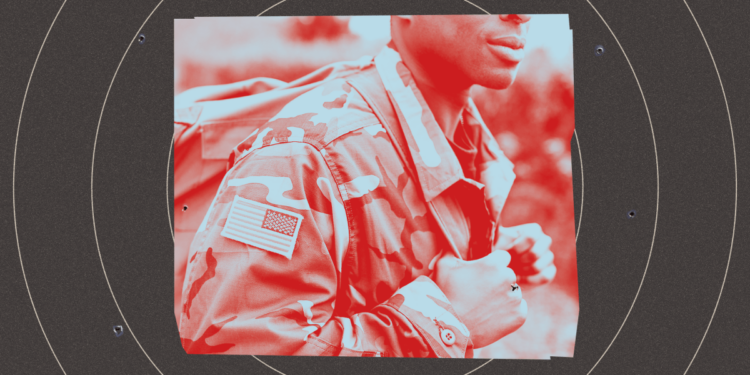In one of his many day-one executive orders, President Donald Trump called for a 90-day hiring freeze of federal employees to “reduce the size of the Federal Government’s workforce through efficiency improvements and attrition.”
Michael Embrich, a US Navy veteran of the Iraq War and War in Afghanistan who also does advocacy work for veterans—including as a policy advisor for the Secretary of Veterans Affairs—has regularly raised his concerns in Rolling Stone and other outlets about how such a freeze would affect those who have served in the military.
“Medical professionals, crisis hotline responders, and claims processors are desperately needed to keep the VA running,” Embrich wrote in Rolling Stone. “Now, with hiring frozen…veterans will wait longer for care, disability claims will pile up, and crisis lines—lifelines for veterans on the brink—will be understaffed.”
Although Trump’s Inauguration Day order states that it “does not apply to military personnel of the armed forces” and submitted an exemptions list via the VA, a subsequent memo from the department says that additional exemptions to the hiring freeze for veterans must pass through the Office of Personnel Management and the Secretary of Veterans Affairs.
I talked with Embrich in January about what is happening and the importance of the VA for not only veterans but also citizens.
How did you get involved in advocating for veterans?
I joined the Navy right out of high school. I have a long line of Navy service in my family. My great-grandfather served during WWI, and my grandfather was torpedoed twice during WWII, so it’s kind of a family tradition. I’m from a town called Bayonne, New Jersey—a very blue-collar town—and was looking for economic opportunities. I didn’t have a lot of college scholarships that excited me, and plus, I probably couldn’t afford to go live on campus somewhere anyway. So I decided to join the Navy for the educational benefits and to be around training and adventure. I joined right before 9/11, so I was immediately deployed for Operation Enduring Freedom and then went back out to sea for Operation Iraqi Freedom.
My goal was to go back to college after getting out of active duty. In 2004, when I started to apply to colleges, I figured out really quickly that the GI Bill was not living up to its promise: free college for military service. When I started to use it as one of the first post-9/11 veterans, it barely covered the cost of tuition.
I figured: “Wow, there’s something we need to do about this.” I worked with my senator, my member of Congress here in Hudson County, and ended up meeting with Senator [Jim] Webb in Virginia, who was the former Secretary of the Navy, and we later came up with the Post-9/11 Montgomery GI Bill. It was my crash course into government and politics.
A lot of the discussion in media coverage of the Trump administration seems to be about how the VA is not efficient and how that justifies cuts. What are some things that people aren’t aware of about this issue?
I think the reason that the VA gets a bad rap—especially from the right—is because it proves that a national healthcare plan can work in the US. I have very good private insurance, but I end up waiting months to see a provider, whereas at the VA, my appointments are scheduled relatively quickly.
The VA also provides specialized care to veterans. There’s a lot of talk in DOGE that the VA should be privatized. That would be a disaster for veterans. You can’t put a veteran with a traumatic brain injury into their local ER or their local general practitioner doctor’s office and say, “Treat this veteran with specialized care for their PTSD.” The VA knows how to do that and to throw it out now would be incredibly detrimental to not only the nation but to our veterans. The VA does have a large budget compared to the rest of the federal government but not compared to the Department of Defense. So why can’t we spend a small percentage of that taking care of veterans?
In one of your recent Rolling Stone stories, you talked about the VA and its capacity for emergency response in situations like the height of the Covid pandemic. What could an expanded VA do to help those both within and outside of the veteran community?
A lot of people also don’t think about the VA’s Fourth Mission to bolster the nation’s preparedness for emergencies: the war on terror, natural disasters, a public health crisis. The VA can outperform the private sector, especially when it comes to national health emergencies. For instance, the VA provided vaccines for non-veterans during the Covid crisis, supplied over one million pieces of PPE early on when people couldn’t get masks, and provided negative pressure rooms [to isolate infected patients]. The VA helped ease that burden on the national healthcare system.
During Hurricane Sandy, the VA was there to provide medical assistance and respond on the spot with mobile VA vans to assist people who may have been injured or displaced.
That’s why this whole nonsense of privatizing the VA misses the mark. When people think of the VA, they think healthcare. Well, the VA provides educational benefits, mortgages, and home loans. The VA provides burial spots and headstones for veterans to be buried. How do you privatize that?
What could the VA or the government do to better support veterans?
The long-term solution is a public healthcare system that serves all Americans. The VA is overburdened with the failures of the private healthcare system—they’re overburdened with people who lack medical care. When a veteran shows up at the VA emergency room and they haven’t seen a doctor in 20 years because they didn’t have outside healthcare, the VA picks up 20 years of lack of medical care to get that person up to speed.
Every time there’s a spending battle in Washington, the VA is caught up in that spending battle. Veterans don’t know if they’re going to get care. Veterans don’t know if they’re going to get their health benefits or their compensation for disability, because if the government’s not funded, then that money is not there.
DOGE’s grand plan is to lay off federal government jobs. Well, 30 percent of those jobs are veterans. If you want to help veterans, don’t fire them from their jobs and put them on unemployment.
Are there certain advocacy groups who are fighting for veterans that we should be paying attention to?
There’s a labor union called the American Federation of Government Employees that represents a lot of veterans.
The last Congress had the same story about the VA—it was inefficient, it didn’t work, and they were going to clean house. They’re picking a fight, but it’s more of a smoke and mirrors operation over there.
The VA doesn’t need a vast overhaul. What it needs is more funding, more attention, and more support from the private sector healthcare system to be better. It doesn’t need to have roadblocks thrown in front of it to perform its mission, but I think that’s what the plan is at this point.







